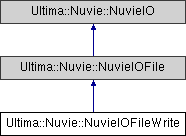|
|
bool | open (const Common::Path &filename) override |
| |
|
bool | open (const Common::String &filename, bool isAutosave) |
| |
|
void | close () override |
| |
|
void | seek (uint32 new_pos) override |
| |
|
bool | write1 (uint8 src) override |
| |
|
bool | write2 (uint16 src) override |
| |
|
bool | write4 (uint32 src) override |
| |
|
void | writeDesc (const Common::String &desc) |
| |
|
uint32 | writeBuf (const unsigned char *src, uint32 src_size) override |
| |
|
uint32 | write (NuvieIO *src) override |
| |
|
virtual uint8 | read1 () |
| |
|
virtual uint16 | read2 () |
| |
|
virtual uint32 | read4 () |
| |
|
unsigned char * | readAll () |
| |
|
unsigned char * | readBuf (uint32 read_size, uint32 *bytes_read) |
| |
|
virtual bool | readToBuf (unsigned char *buf, uint32 buf_size) |
| |
|
uint32 | get_size () const |
| |
|
void | seekStart () |
| |
|
void | seekEnd () |
| |
|
bool | is_end () const |
| |
|
bool | is_eof () const |
| |
|
uint32 | position () const |
| |
File writing class. This can be done in one of two ways. If it's a simple filename, then it uses the savefile interface to write it as uncompresed to the save folder. However, if it has relative paths, such as used by the code to dump out all tiles or maps, it uses a Common::DumpFile instead

 Public Member Functions inherited from Ultima::Nuvie::NuvieIO
Public Member Functions inherited from Ultima::Nuvie::NuvieIO Protected Attributes inherited from Ultima::Nuvie::NuvieIO
Protected Attributes inherited from Ultima::Nuvie::NuvieIO